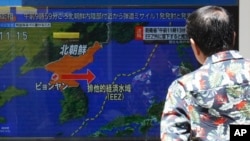North Korea has fired a single long-range ballistic missile off its east coast, as leaders of Japan and South Korea are in Lithuania for NATO meetings and are due to hold a bilateral summit later Wednesday.
The suspected intercontinental ballistic missile was launched at around 10 a.m. local time from an area around the North's capital, Pyongyang, South Korea's Joint Chiefs of Staff said.
The missile flew in a lofted trajectory, piercing through the earth's atmosphere, to land some 1,000 kilometers to the east, according to Seoul and Tokyo.
Japan estimates the missile reached a top altitude of more than 6,000 kilometers before splashing down 74 minutes after launch. If true, that would mark the longest duration flight for a North Korean missile, according to Japan's defense ministry.
From Lithuania's capital of Vilnius, South Korean President Yoon Suk Yeol convened an emergency National Security Council meeting via video call with relevant ministers in Seoul.
Condemning the launch, Yoon said North Korea's illegal activities would come with a price, according to his office, and promised to galvanize support with nations convened at the NATO summit. He also ordered a further strengthening of extended deterrence, with an inaugural U.S.-South Korea Nuclear Consultative Group meeting planned for next week.
Japan's Chief Cabinet Secretary Hirokazu Matsuno said Tokyo immediately lodged a strong protest against North Korea via its embassy in Beijing, underlining that such ballistic missiles violate multiple United Nations Security Council resolutions. Japan at this stage does not believe the detected missile carried a "so-called satellite," he added.
Ahead of the missile launch on Tuesday, 31 NATO countries issued the Vilnius Summit Communique in which they called on Pyongyang to abandon its nuclear weapons program in a complete, verifiable and irreversible manner and accept repeated offers of dialogue.
On the second day of the summit, members of the Asia-Pacific 4 grouping – Japan, South Korea, Australia and New Zealand – are engaging with NATO countries over China's influence in the region.
A bilateral summit between Japanese Prime Minister Fumio Kishida and South Korean President Yoon is also planned Wednesday, during which the two leaders are expected to discuss Japan's plan to release treated wastewater from the crippled Fukushima Daiichi nuclear plant.
Raising the temperature
North Korea's latest missile launch comes on the heels of a trio of angry statements out of Pyongyang over what it claimed were illegal U.S. drones and reconnaissance planes "intruding" on its exclusive economic zone to spy on the state along its eastern coastline earlier this week.
The latter two of the three statements came directly from leader Kim Jong Un's influential sister, who warned North Korean forces would react "clearly and resolutely" should the U.S. cross into its economic zone again.
Both Seoul and Washington countered that any aerial maneuvers were routine in nature, and that Pyongyang's claims that "U.S. flights above its claimed exclusive economic zone are unlawful are unfounded," according to State Department Spokesperson Matthew Miller Tuesday, "as high seas freedoms of navigation and overflight apply in such areas."
Analysts in Seoul expressed concern that the repeated warnings within 24 hours could be North Korea setting up for additional provocations in the region ahead of a key anniversary on July 27, which marks the signing of an armistice that put a pause on the Korean War.
North Korea refers to it as Victory Day and is believed to be planning a large military parade for the occasion. But that may not be enough.
"North Korea has to celebrate the 70th anniversary [of Victory Day] with achievement in the military or economic field," Won Gon Park, professor of North Korean studies at Ewha University tells VOA.
But given that the North has been struggling economically, hampered by ongoing COVID-19 border controls, and militarily, its failed spy satellite launch at the end of May, which South Korea evaluated as having no military utility, it is left with few options.
"That's why North Korea has to escalate tension, releasing these aggressive statements by Kim Yo Jong, which is at a very high level. This is a very typical pattern when they face difficulties domestically and internationally," Park added.
Wednesday's launch of a long-range ballistic missile is the first since April 13 when Pyongyang had tested a solid fuel ICBM, the Hwasong 18, for the first time.
Others warned against too quickly attributing the latest missile test as a response to U.S. reconnaissance flights or the NATO summit.
"If indeed today's launch was a follow-up test to the Hwasong 18, this is North Korea developing its missile technology on its own timeline," offered Kim Dong Yup, a professor of military and security studies at the University of North Korean Studies in Seoul.
"I'd caution against too quickly tying this to the Kim Yo Jong statements or the NATO meetings. That could make it more difficult to respond."
Juhyun Lee contributed to this report.




